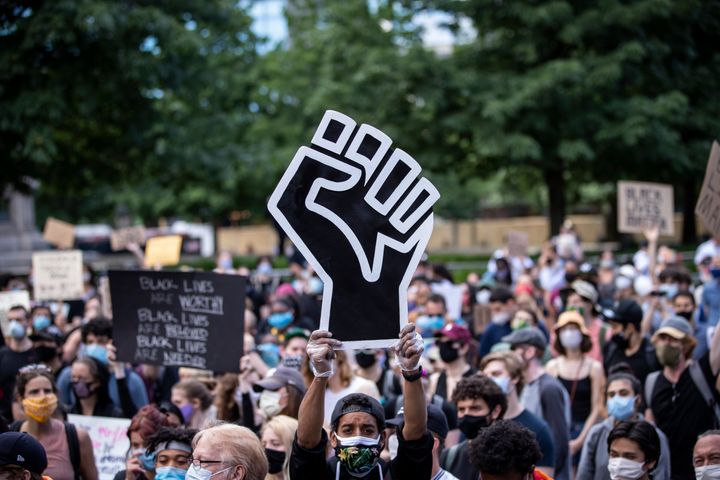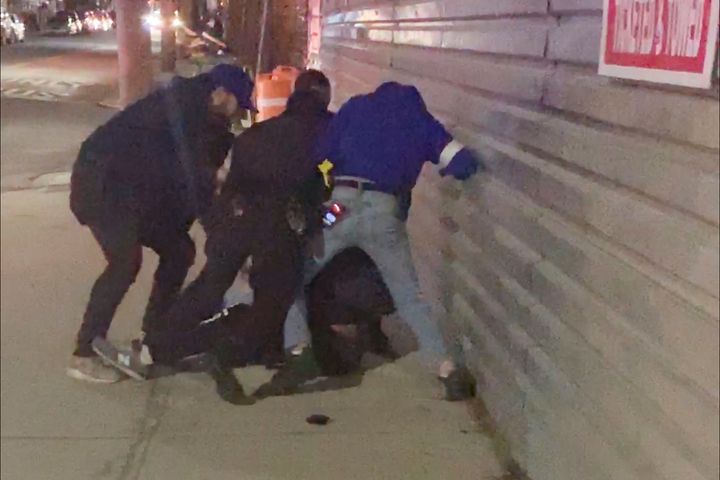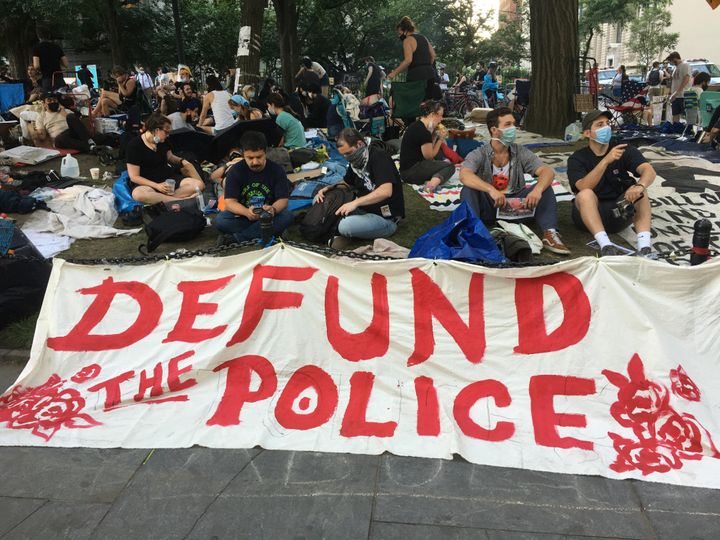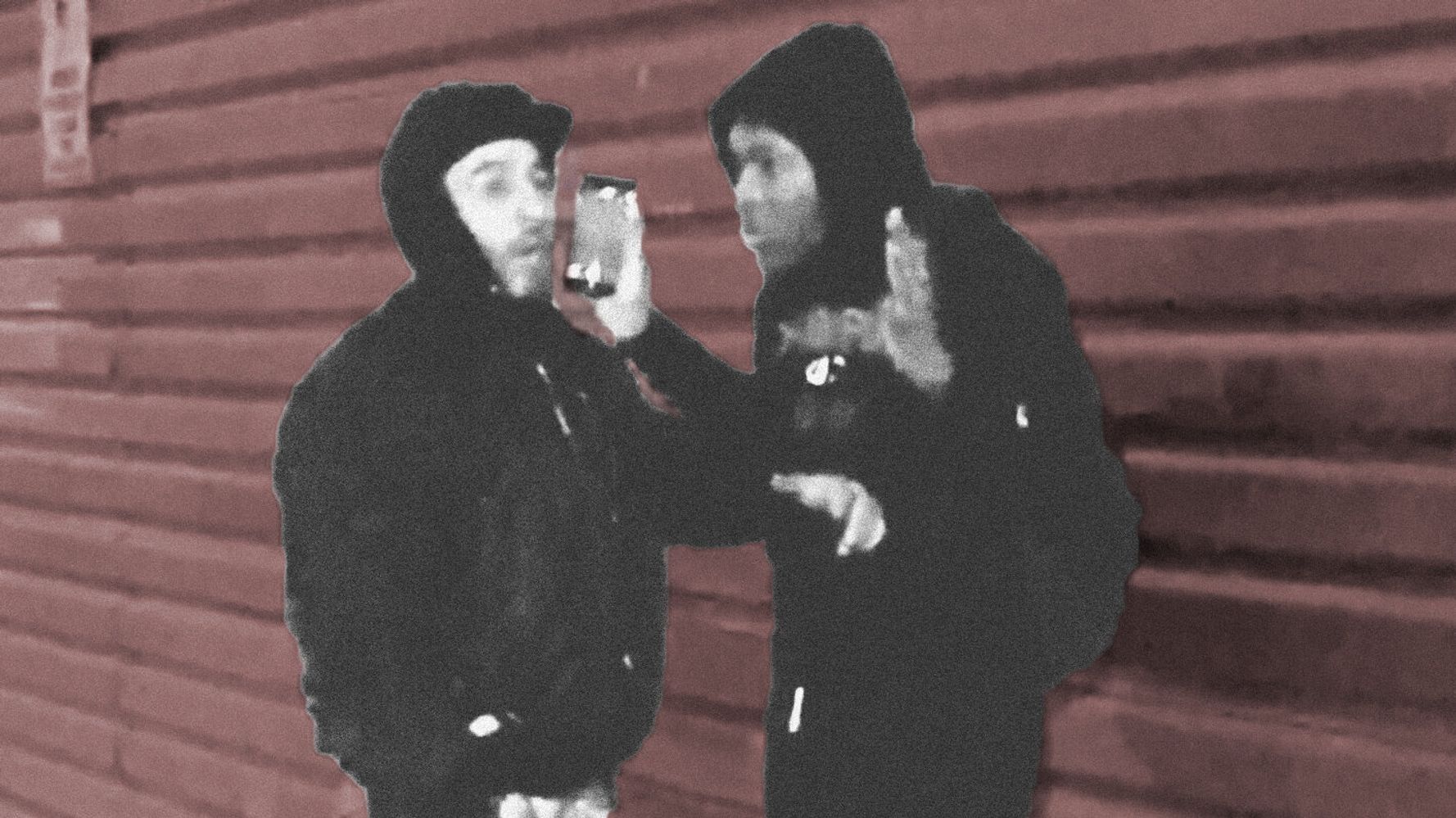[ad_1]
On a mild Wednesday evening in March, about two weeks before the pandemic all but shut down New York City, 20-year-old Fitzroy Gayle stopped in a park in the Brooklyn neighborhood of Canarsie to unwind on his way home from work.
While responding to a report of shots fired in the area, New York Police Department officers claim they observed Gayle, who is Black, and another man smoking marijuana in the park. The police say Gayle ran away as they approached. Gayle says he simply walked out of the park.
A bystander captured the subsequent confrontation on her cellphone. Video showed a plainclothes officer pushing Gayle, whose hands are in the air, up against the wall. Gayle repeatedly asks what crime he committed, to which the officer responds, “Stop moving.”
Moments later, at least six additional officers can be seen charging toward the scene before violently forcing Gayle, who is unarmed, to the ground as he cries out for help. “Please, stop! You’re hurting me!” he screams.
Gayle was detained in Brooklyn’s 69th Precinct for several hours and was charged with resisting officers and obstruction of governmental administration in the second degree. He was also cited for unlawful marijuana possession in the second degree, though he has said he didn’t have any weed on him when he was arrested. The charges were dismissed in April. It’s unclear what happened to the man Gayle was with in the park.
Video of Gayle’s arrest, viewed millions of times on Twitter, garnered national headlines and sparked instant outrage. For Gayle, the initial outpouring of support was swift and intense. But three months later, amid a nationwide reckoning on police brutality and systemic racism, the officers that arrested Gayle remain on active duty and the mental anguish he inherited that night continues to fester. Gayle, unlike too many other Black people confronted by police, survived the incident. But that doesn’t mean it wasn’t traumatic, both physically and mentally.
After the NYPD’s announcement of an “internal review” of the arrest a day later, the media largely moved on. Then came the all-consuming news coverage of the coronavirus crisis and the police killing of George Floyd and subsequent widespread protests.
“This case should not be lost in the storm,” Rev. Kevin McCall, the spokesman for Gayle’s family, told HuffPost earlier this month. “Fitzroy Gayle could have been another George Floyd.”
‘We’ve Always Known’
Police incidents like Gayle’s don’t always result in death, but they’re painful, widespread and too often swept under the rug, according to community activists and legal experts.
There’s no official national database that keeps track of police shootings or misconduct. Following Floyd’s death, House Democrats proposed police reform legislation that would include the creation of one. The Washington Post, in 2015, created its own database of fatal police shootings. It found Black Americans were shot and killed by police at a much higher rate than white Americans. But the data doesn’t account for non-lethal use of force or misconduct.
“A lot of the awakening that we’re seeing right now in New York City and across America is that people outside of Black and brown people in working-class and low-income neighborhoods are finding out all the things that we’ve always known,” said Anthonine Pierre, deputy director of Brooklyn Movement Center, a Black-led community organizing group.
“The role of the media is to take these injustices and make them the problem of more than Black and brown people,” she added.

Bystander video, which became especially widespread after the New York police killing of Eric Garner in 2014, has been a powerful tool in shining a light on police brutality, Pierre said. But injustices still occur when there isn’t someone with a cellphone nearby.
“For every Fitzroy Gayle, how many people suffered that fate from the police officers but nobody believed it because you couldn’t see it?” Pierre said.
Last week, the NYPD disbanded its plainclothes unit, which included some of the officers from Gayle’s arrest, according to Gayle’s attorney, Sanford Rubenstein. All of the officers in the 600-person unit were reassigned to other teams within the department, including the detective bureau and the neighborhood policing initiative.
The officers involved in Gayle’s arrest remain on active duty, a spokesperson for the NYPD told HuffPost earlier this month. Asked for an update on the internal review, the spokesperson said there was none.
NYPD Police Commissioner Dermot Shea and New York City Mayor Bill de Blasio (D) said during a press conference on March 5 that they “have concerns” about Gayle’s arrest. Shea acknowledged there were some “disturbing points” in the video of the incident. He also accused Gayle of “running” and suggested he felt the officers’ actions may have been warranted.
“This was painful to watch,” de Blasio tweeted the day of the press conference. “We still need to get all the facts about this case and a full investigation is underway, but I don’t like what I saw.”
De Blasio’s office declined to comment for this story.
‘Absolutely An Excessive Use Of Force’
To some legal experts, the conclusion from a review should be obvious: “It was absolutely an excessive use of force,” said Jennvine Wong, an attorney with The Legal Aid Society’s Cop Accountability Project.
“It was also really endemic of what Black and Latinx men especially, especially young men of color, face in New York City: constantly getting stopped for these low-level offenses,” she added. “It is brutal. And it is unjustified.”
Gayle is still recovering from some of the injuries he sustained during the arrest, including to his neck, knee and ankle, Rubenstein said. He shares the emotional burden of that night with his mother, Daphne Gayle.
“They’re not supposed to treat him like an animal,” Daphne Gayle said during an interview in March with PIX11. “It’s just something I will never forget.”

Incidents of police brutality can have significant psychological impacts on its victims and people who witness it, such as those who watch it on the news and social media, said Erlanger Turner, an assistant professor of psychology at Pepperdine University and author of “Mental Health Among African Americans.”
Race-related trauma, which includes but isn’t limited to police violence, can lead to symptoms of anxiety and depression and may contribute to a higher risk for developing post-traumatic stress disorder, Turner said.
A 2016 study conducted by researchers at Emory University and the University of Washington found that men who live in a neighborhood with aggressive policing tactics and surveillance report more nervousness and feelings of worthlessness.
What’s more, having these cases drag on and go unresolved could increase feelings of hopelessness, Turner said.
“If you sort of continually experience these incidents over time and don’t get help to work through that trauma, it could put you at a much higher risk of developing a diagnosis,” he said.
Allegations Of Racism Within NYPD
On the night of her son’s arrest, Daphne Gayle spent hours at the 69th Precinct desperately seeking information about his case and updates on his release. Officer Terence Dickerson answered her questions as best he could.
Dickerson, who is Black, had been at the precinct when his fellow officers apprehended Gayle earlier that night, but his superiors assigned him to be the arresting officer in the case.
In a notice of claim filed against the city last month, Dickerson alleges a pattern of racial discrimination within the NYPD. He also accuses his supervisors of forcing him to be the arresting officer in Gayle’s case in an attempt to “cover up” the actions of the officers involved and as retaliation for complaining about being pressured to increase arrests and summons.
Now, Dickerson is being investigated in Gayle’s case even though he had nothing to do with the arrest, Dickerson’s attorney John Scola said.
Dickerson is seeking $5 million in damages from the city.
Asked about Dickerson’s case, the NYPD declined to comment on pending litigation. The NYC Law Department, which handles the city’s legal affairs, did not immediately respond to a request for comment.
‘We Have To Keep The Pressure On’
Two days after the Brooklyn District Attorney’s Office dismissed the charges against Gayle, Rubenstein filed a notice of claim against the city on behalf of his client seeking $50 million in damages.
Gayle and his family are calling for the officers to be fired and for the district attorney’s office to file criminal charges against them.
A spokesman for the district attorney’s office said the office does not comment on investigations.

McCall, who supports calls to defund the police, met last week with representatives from the Commission to Combat Police Corruption, a body whose members are appointed by the mayor to monitor and evaluate the NYPD’s anti-corruption efforts. He said Tuesday that he feels optimistic that justice will eventually be served in Gayle’s case.
“We have to keep the pressure on as we continue to fight for Fitzroy Gayle and his family,” McCall said. “These officers need to be perp walked and once that happens, we can jump for joy and be in a good place.”
As the anti-racism protests unfolded across the country following Floyd’s death, Gayle took action from inside his home, signing petitions and raising awareness on social media. He called Floyd’s brother, Terrence Floyd, to offer support and prayers.
But his physical injuries and the fear that has been resurfaced by the images of police shoving protesters are keeping him from taking his activism to the streets, according to McCall.
“When advocates talk about the NYPD terrorizing or acting like they’re an occupying force in neighborhoods, this is what they mean,” Wong said. “It traumatizes a generation.”
Calling all HuffPost superfans!
Sign up for membership to become a founding member and help shape HuffPost’s next chapter
[ad_2]
Source link

